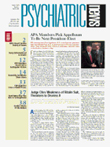While the 2001 annual meeting will impart the latest information in psychiatry, APA realizes that the annual meeting represents an opportunity to showcase the work of outstanding figures in other fascinating fields. And so meeting planners have invited playwright Doug Wright and computer expert Ray Kurzweil to present lectures at this year’s annual meeting.
Wright wrote the screenplay for the film “Quills,” which he based on his play of the same name about the Marquis de Sade. He will present the lecture “Quills: The Marquis on the Marquee” on Wednesday, May 9, at 11 a.m.
Over the years, said Wright, the Marquis de Sade has been a potent Rorschach for artists; he’s been appropriated by the surrealists, by the German playwright Peter Weiss, and by authors as diverse as Yukio Mishima and Camille Paglia.
Wright will discuss key biographical moments in the life of the Marquis, questions of poetic license in literary adaptation, and the research employed to recreate an early 19th-century asylum on stage and on film. He will also discuss the birth of his play “Quills” at the New York Theater Workshop in Manhattan’s East Village and trace its metamorphosis all the way to its big-screen counterpart starring Geoffrey Rush, Kate Winslet, Joaquin Phoenix, and Michael Caine.
Kurzweil, a 1999 winner of the National Medal of Technology, was the first to develop a print-to-speech reading machine for the blind, CCD flat-bed scanner, text-to-speech synthesizer, and commercially marketed large-vocabulary speech-recognition system. He will speak on “Why We Will Spend Most of Our Time in Virtual Reality in the 21st Century” on Thursday, May 10, at 9 a.m.
Kurzweil started his first major enterprise in 1974, Kurzweil Computer Products Inc., to pursue his interest in pattern recognition, attacking the problem of teaching a computer to identify printed or typed characters regardless of font and print quality.
Among other companies, he also established Kurzweil Music Systems, with Stevie Wonder as musical advisor, and developed the first computer-based instruments that realistically recreated the full musical response of the grand piano and other orchestral instruments.
One of Kurzweil’s latest ventures is FAT KAT (Financial Accelerating Transactions-Kurzweil Adaptive Technologies), which is applying evolutionary—and some would say none to soon—algorithms to stock-market decisions with the goal of creating an artificially intelligent analyst. Another is Medical Learning Company, which is creating a simulated patient for doctor education and computer games.
The location for both lectures will appear in the program book distributed on site at the annual meeting. ▪
